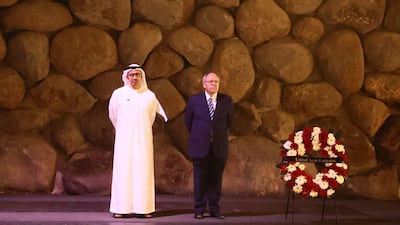A bipartisan group of US senators has praised the Abraham Accords as an opportunity for regional peace and American leadership to counter Iran's role in the Middle East.
The Accords were signed at the White House on September 15, 2020, and normalised relations between Israel, and the UAE and Bahrain.
The delegation, including Democrat Jacky Rosen and Republican James Lankford — co-founders and co-chairs of the Senate Abraham Accords Caucus — travelled to Israel, the UAE, Bahrain and Morocco, which later joined the pact.
“Through continued success of the Abraham Accords, we will demonstrate to the world the value, importance and need for enduring American leadership," Ms Rosen said on Tuesday.
"The Accords are a beginning, not an end to our engagement".
Mr Lankford said the delegation was pleased with the “frank conversations with all four nations".
The White House has vowed to expand the accords.
Democratic Senator Kirsten Gillibrand, who was among those on the delegation, said the trip was the "most optimistic" of her travels to the Middle East.
"It's the first time I've really seen an opportunity for long-term peace in the region,” Ms Gillibrand said.
Sheikh Abdullah bin Zayed in Israel - in pictures
Abraham Accords countries and Washington consider Iran to be their "number one concern from a safety and security and stability", Ms Gillibrand said.
She said that the Accords partners intended to use this moment to deepen relationships and expand investment.
National security advisers from the UAE, Bahrain, the US and Israel promised enhanced regional integration and co-operation after multilateral talks last week, which focused on security and the climate crisis.
The congressional delegation echoed the emphasis from the national security advisers on the importance of water and energy in the region.
Ms Rosen said Washington must give priority to support for “tangible projects and initiatives” in the region that promote integration and problem-solving.
“Real ties between people are what turned an agreement on paper into real lasting peace. And this does not happen overnight,” she said.
But Senator Mark Kelly said there was much work to do, particularly on “the plight of Palestinians in the West Bank and Gaza Strip".
“A two-state solution … is essential for stability in the region. And if we can't figure this out, this is going to result in the Iranians having more influence,” Mr Kelly said.
Mr Lankford said it was important to leaders from the UAE, Bahrain and Morocco that the US delegation met Palestinian leaders on their trip, as well.
The delegation played down controversy over Ms Rosen's request not to meet far-right Israeli ministers Itamar Ben-Gvir and Bezalel Smotrich, or with anyone from their Otzma Yehudit and Religious Zionism parties.
Members of the US delegation stressed that they would not have met those ministers anyway. They said they were only meeting key foreign policy and defence ministers.





